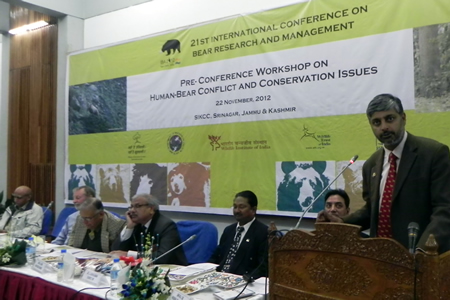 Vivek Menon addresses the participants
Vivek Menon addresses the participants
Srinagar, November 22, 2012: International and national experts met today in Srinagar to brain storm and produce a protocol for dealing with human-bear conflict.
All range countries of the eight bear species found globally are afflicted by various forms and degrees of conflict. The one day workshop was organised by the Department of Wildlife Protection, the Wildlife Trust of India (WTI) and the Wildlife Institute of India (WII) as part of the upcoming International Conference on Bear Research and Management, hosted by the Ministry of Environment and Forests, Govt. of India and organised jointly by WTI, WII and CZA (Central Zoo Authority) and organisations including the World Society for the Protection of Animals (WSPA) and International Fund for Animal Welfare (IFAW) from 26-30th November 2012. Over 350 delegates from 35 countries are expected to participate.
Jammu and Kashmir, as other parts of the country has been experiencing elevated human wildlife conflict in the recent past and while strategies to deal with these situations have been worked out in the past, this document is expected to provide guidance to managers dealing with conflict situations.
In his opening remarks, Vivek Menon, Executive Director, WTI said that bears were true representatives of wildlife with regard to coverage (as bears have a wide distribution in India, being found in 26 of 28 Indian states) and issues truly reflects the wildlife scenario of the country.
AK Singh, the Chief Wildlife Warden of the state said that with the help of strategies developed by the government and various NGOs like the WTI and Wildife SOS, the magnitude of damage in the form of human causalities had come down significantly through improved infrastructure, upgradation of skills and the necessary changes in policy which had improved the departments’ capacity to respond.
Dr John Beecham, the co-chair of the IUCN/SSC bear specialist group, gave a global perspective of the bear human conflict and said that human communities bore the bulk of economic losses and relief for such losses was one important way of dealing with conflict.
The chief guest for the workshop, Dr MK Ranjitsinh while commending the government for having improved the way the conflict situation was handled, deplored the lack of attention, at the national level, on the state of the brown bear which he felt was critically threatened and where the state had to play an important role, possessing most of the populations in the rather restricted range of the animal.
The participants after the first technical session when various participants from other parts of the world and the state made presentations, were split into five working groups, produced independently, guidelines for five main themes – definitions and classification, human welfare concerns, animal welfare concerns, drivers of conflict and implementation. These were presented in a plenary, discussed and finally draft guidelines arrived.